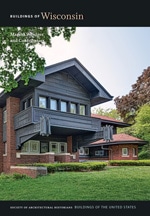
This dramatic Greek Revival house was the home of Platteville’s founder, John H. Rountree. A native of Kentucky, Rountree came to Wisconsin’s lead-mining region as a prospector, staking a claim along the Little Platte River in 1827 and building a lead-smelting furnace the following year. Before long, a settlement grew up around the mine, leading Rountree to establish the village of Platteville in 1834. In numerous ways Rountree built Platteville into a community. He opened its first store and its first newspaper, helped organize one of the state’s first Methodist Episcopal churches, and erected the first village school. He also served the area as a judge, a territorial representative, a constitutional convention delegate, and a state senator. He was one of the first regents appointed to the University of Wisconsin and helped found the Platteville Academy (now the University of Wisconsin–Platteville).
An important man required a house that reflected his stature. The imposing structure looks much like a southern antebellum house. One of the earliest brick buildings in the area, the house has fine proportions and handsome detailing. It consists of a two-story rectangular, side-gabled block with a two-story wing extending from a rear corner. Across the main facade, Tuscan columns support a double portico, topped by scrolled brackets below the cornice.





